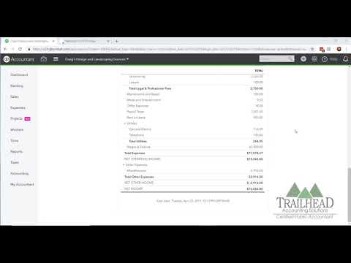Content

With an expense account, you can easily compare your outgoing and incoming money. And by separating your expenses into different accounts, you can determine where all of your money is going.
- When a business pays for its expenses in advance, the amount paid is not recognized as an expense but rather an asset which is referred to as prepaid expenses.
- For example, a company’s December 2019 utilities expense was only paid in January 2020.
- Go a level deeper with us and investigate the potential impacts of climate change on investments like your retirement account.
- Not all companies are unable to buy their property to operate businesses.
- We follow ethical journalism practices, which includes presenting unbiased information and citing reliable, attributed resources.
- However, travel expense is not exclusive to the cost of transportation.
- Now that the basics of expenses have been covered, we can start to cover expense accounts and why they’re important.
Common expenses include payments to suppliers, employee wages, factory leases, and equipmentdepreciation. Your expense account might consist of various goods and services such as income expenses that are paid to employees, supplies and business utility and maintenance costs.
What Is an Expense Account? Definition, Types & Tips
There is often a debate as to which method should be used to record expenses. While the cash basis of accounting may be simpler, the accrual basis is considered to be more accurate. It is important to maintain expense accounts so that you can keep track of the different expenses that your business incurs. The reason behind splitting expense accounts up into smaller accounts is for tracking purposes. This organizational method to reviewing expense accounts is invaluable.
https://intuit-payroll.org/s can also be defined as variable expenses; those that change with the change in production. Expenses can also be categorized as operating and non-operating expenses. The former are the expenses directly related to operating the company, and the latter is indirectly related. Operating expense is deducted from revenue to arrive at operating income; the amount of profit a company earns from its direct business activities. Examples of expense accounts are Costs of Sales, Cost of Goods Sold, Costs of services, Operating expense, Finance Expenses, Non-operating expenses, Prepaid expenses, Accrued expenses and many others.
How to Close an Expense Account
However, to make money you have to spend money, or so the old saying goes. As such, business owners need to be aware of their business expenses. The best way to do that is through organizing your accounting books. You may have other expenses that require a separate expense account category, like business loan payments. Again, anything you spend money on relating to your business is considered an expense. For example, a business may pay for internet service in their offices monthly but receive and pay the bill the following month. However, they will record the expense for internet service for the month the cost was incurred, even though payment was made the following month under accrual accounting.
- On some income statements, expenses are categorized as selling and administrative.
- Two out of every five new cars, we are told on good authority, are expense account, scot-free, one-man commuter cars.
- For example, if a business owner schedules a carpet cleaner to clean the carpets in the office, a company using the cash basis records the expense when it pays the invoice.
- This might include electricity, water, gas, marketing, etc.
Rent Expense – cost paid or to be paid to a lessor for the right to use a commercial property such as an office space, a storeroom, a building, etc. Cost of office supplies such as paper, pens, ink toner, etc. Interest expenses – this involves the amounts owed on any interest due for small business loans, for example.
List of Expense Accounts
A common nonoperating expense for a retailer is interest expense. An operating expense is an expenditure that a business incurs as a result of performing its normal business operations. Yes, salary is considered an expense and is reported as such on a company’s income statement.

75XXXX Equipment and Capital Outlay This account pool includes the payments for acquiring legal ownership to equipment, including the related inbound transportation and installation charges. Thus, this account pool includes all expenditures for tangible resources which are may be subject to fixed asset controls. Items costing $5000 or more will be automatically recorded through the FAS System. Also it includes library books, journals and artistic creations. Per GASB Statement 51, intangible assets costing $100,000.00 or more are also considered capital assets and new accounts have been provided accordingly for classification of these types of assets. Appalachian will no longer inventory items that cost between $1,500 and $4,999.99 as required by the previous policy.
The P&L What Is An Expense Account? , when published as a financial statement, is a summary of all the income and expense accounts that reflect the year’s trading transactions. Repairs are corrective and restorative following wear and deterioration of an asset, maintenance is preventive and anticipatory. The contractual services may be performed by commercial firms, state agencies and intra-institutional divisions.
